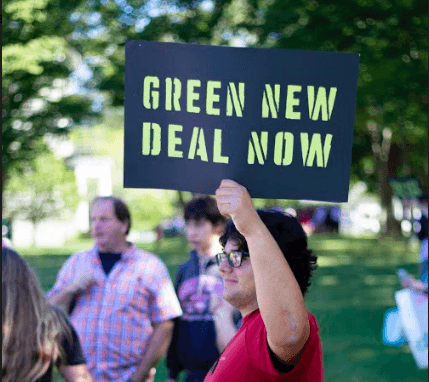Students gathered on the Quad on Friday to advocate for a Green New Deal in hopes of preventing climate change. Photo by Greg Clark.
Climate activists protested on the quad Friday afternoon through speeches, picket signs and a “die-in” to illustrate potential consequences of unchecked climate change.
According to the event’s sign-in, 158 people participated in the strike, which occurred from 2-3 p.m. on Sept. 27. Students, faculty, staff and members of the Sunrise Movement, which is a climate activist organization, were among the protesters.
Activists held picket signs and walked around the quad during the first part of the demonstration. The event also included a booth in which participants could write letters to elected officials, as well as a voter registration drive.
After initial check-in, several organizers spoke about the importance of the protest. Danielle Bilecki, a member of the Sunrise Movement, acknowledged that the climate movement needs to be more mindful of indiginous people and people of color, who have been historically ignored by environmental activists. According to the Joint Center for Political and Economic Studies, people of color are disproportionately affected by climate change.
Junior environmental science student Kaylynn Polley said that the effects of climate change are already visible through disasters such as fires in the Amazon rainforest and extreme storms such as Hurricane Dorian, which wreaked havoc in the Bahamas in early September. Polley added that most politicians are not doing enough to combat climate change, but one suggested piece of legislation resonated with her.
“Young people live with this crisis every day,” Polley said. “It makes us depressed, it makes us anxious and apathetic about our democracy and our political system. But we have a solution on the table that measures up to the scale and urgency of this crisis: the Green New Deal.”
Polley also said that scientists predict that the world has until 2030 to reverse climate change. She believes that corporate and political interests have prevented leaders from understanding and caring about the shocking statistics.
“The bare minimum is no longer acceptable, and we have no time for leaders who do not understand that this climate crisis is an existential threat,” Polley said.
Oceanography professor Jaime Palter then told demonstrators that seeing so many young people participate in protests gave her hope. She added that although older generations caused climate change through increased emissions of fossil fuels, younger people have been forced to bear the burden of the problem.
“People born right now are basically late to an over-indulgent party,” Palter said. “They’re showing up, but five-sixths of the chips are gone. And not only that, but the roof is leaking at the house party, the floor is about to collapse and there is not that much to eat.”
Despite the bleak image, Palter said that she has seen technology evolve significantly throughout her life, using the evolution of devices that play music as an example. She believes that if humanity can transition from radio to cell phones in 40 years, humanity can also transition to green energy, climate-friendly lifestyle changes and technology.
The main event was a “die-in” demonstration, in which protesters laid on the ground pretending to be deceased, symbolizing those who could die due to climate change. Strikers’ bodies blocked pathways on the quad as they raised their signs in the air. During the demonstration, Bilecki played an excerpt of a speech by noted climate activist Greta Thunberg.
After the demonstration, organizers opened the floor to public comment. Freshman Marguerite McNamara explained that while listening to Thunberg, she thought about how disappointing it was that someone so young has to fix the problems caused by an older generation. However, McNamara also expressed hoped that her generation had the passion to make things different in the future.
Students also talked about how climate change personally impacted them already. Guilermo Ruiz, a graduate student in environmental science, explained that he was home in Puerto Rico during Hurricane Maria in 2017. Ruiz said that climate change is to blame for the hurricane, as well as many other recent natural disasters. Seeing the effects first-hand left a strong impact on him.
“I was lucky that I only spent three months without electricity, and only two months without water,” Ruiz said. “There were people on my island who lost their homes, people who lost their lives. I’m lucky because other islands in the storm’s path were completely wiped off the map. The thing is is that we are not that lucky for long. They’ve told us that these kind of storms, these category fives, there’s just more and more coming. I’m lucky, but I wish I could give that luck to the hundreds of thousands of people who have suffered and will continue to suffer.”
Sunrise members felt that having the strike in a more rural location made the demonstration more intimate.
“The strike last week was pretty big in Providence, that’s where Sunrise put most of its attention for that one,” Bilecki said. “This week is meant to be less mass-movement and more local movement. So we are moving from the State House to the community that we represent, which for a lot of us is the University of Rhode Island.”
Ultimately, Bilecki hopes that the demonstration inspires those who participate, as well as those who only see it, to try to make a real change.
“Coming together as a community, maybe for some people this will activate them to do more than just like a post online,” Bilecki said.

